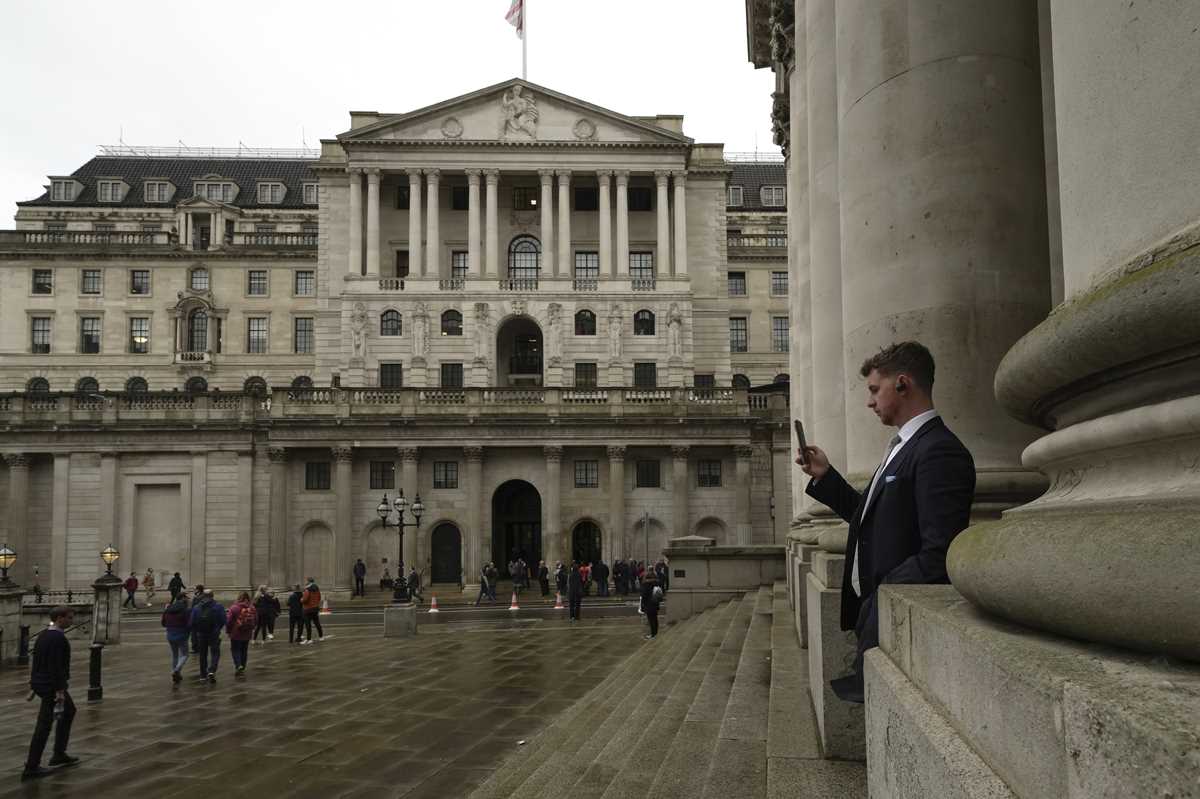 A man walks in front of the Bank of England, at the financial district in London, on Nov. 3, 2022. The Bank of England is expected to raise interest rates by as much as half a percentage point Thursday, Feb. 2, 2023 as it seeks to tame the double-digit inflation fuelling a cost-of-living crisis, public-sector strikes and fears of recession. (AP Photo/Kin Cheung, File)
A man walks in front of the Bank of England, at the financial district in London, on Nov. 3, 2022. The Bank of England is expected to raise interest rates by as much as half a percentage point Thursday, Feb. 2, 2023 as it seeks to tame the double-digit inflation fuelling a cost-of-living crisis, public-sector strikes and fears of recession. (AP Photo/Kin Cheung, File)LONDON (AP) — The Bank of England is expected to raise interest rates by as much as half a percentage point Thursday as it seeks to tame the double-digit inflation fueling a cost-of-living crisis, public-sector strikes and fears of recession.
The move would push the U.K.’s key rate to 4%. Economists suggest this may be the last big rate increase for Britain’s central bank, which has approved 10 consecutive hikes since a post-pandemic surge in the world economy and Russia's war in Ukraine drove inflation to 40-year highs.
The U.S. Federal Reserve has already begun tapering its response, boosting its key rate by just a quarter-point on Wednesday. The European Central Bank, meanwhile, is expected to go big again, with a half-point hike Thursday.
Optimism grew that rate increases may begin to tail off after U.K. inflation eased for a second straight month to 10.5% in December, down from a peak of 11.1% in October. That’s still far higher than in the U.S. and the 20-country eurozone, where inflation slowed to 6.5% in December and 8.5% in January, respectively.
With the cost of food and services rising and wage increases outstripping forecasts, most economists expect the Bank of England’s Monetary Policy Committee, or MPC, to send the message that it is serious about fighting inflation. But it is likely to be a close decision, with some economists suggesting that the bank will opt for a quarter-point increase in its key rate as energy prices fall and concerns about sluggish economic growth take center stage.
“We expect the MPC to raise Bank Rate to 4% in February — likely its last ‘forceful’ hike in the tightening cycle,” Sanjay Raja, Deutsche Bank’s chief U.K. economist, said in a note to clients. But “with inflation past the peak and forward looking data continuing to point to both sluggish growth and easing price pressures, the MPC could opt to slow the pace of hikes sooner rather than later.”
After more than a decade of record-low interest rates, the Bank of England began raising borrowing costs in December 2021, when its key rate stood at just 0.1%. The bank stepped up its fight against inflation last year, approving four big increases of a half-point or more since August to bring the rate to 3.5%.
Inflation soared after Russia’s invasion of Ukraine fueled sharp increases in food and energy prices, leading to the U.K.’s biggest drop in living standards since the 1950s. That has triggered a wave of strikes — including the biggest day of industrial action in more than a decade on Wednesday — as nurses, train drivers, border guards and teachers demand pay increases. The government is trying to prevent higher wages from causing a second round of domestically driven inflation that could be more difficult to tame.
Rising prices also are choking off economic growth and squeezing public finances as the government spends billions to help consumers and businesses hit by high energy costs this winter.
The International Monetary Fund this week said that the U.K. was on track to be the only major economy to shrink this year, even as the outlook for the rest of the world improves. The IMF said that the country's gross domestic product was likely to contract by 0.6% in 2023, compared with a previous forecast of 0.3% growth.
The Bank of England will release its own updated economic forecasts Thursday, with economists expecting a more optimistic picture than the IMF’s as energy prices stabilize.
Wholesale natural gas prices in Britain are down 75% from their peak in late August, which will translate into lower costs for businesses and consumers in coming months.
Martin Beck, chief economic adviser to economic forecasting group the EY Item Club, said that the central bank’s November forecast for a record two-year recession now looks overly “downbeat.”
“The significant fall in wholesale gas prices in the last few months means inflation should fall faster and the economy shrinks by less, and for less time, than the Bank of England anticipated three months ago,” he said.
Before you make your next trade, you'll want to hear this.
MarketBeat keeps track of Wall Street's top-rated and best performing research analysts and the stocks they recommend to their clients on a daily basis.
Our team has identified the five stocks that top analysts are quietly whispering to their clients to buy now before the broader market catches on... and none of the big name stocks were on the list.
They believe these five stocks are the five best companies for investors to buy now...
See The Five Stocks Here
Click the link below and we'll send you MarketBeat's list of the 10 best stocks to own in 2024 and why they should be in your portfolio.
Get This Free Report
